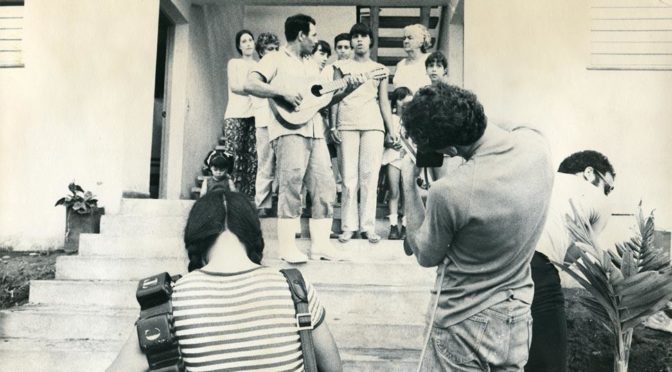There has been a lot of talk about Netflix joining one of the big festivals for the first time in 2015 with Beasts of No Nation. This year a few Netflix-Productions are present at the Lido again: Starring Jane Fonda and Robert Redford in ‚Our souls at night‘, the series Wormwood and Suburra as well as ‚Cuba and the Camera Man‘, a 40- years-in-the-making documentary about life and times in Cuba.
To start with the effort and dedication involved in this project are great: 40 years of continuous visits, meeting and finding people again. For Jon Alpert, doubling as director and cameraman most of the time, it all starts with the Cuban Revolution and an interest in the struggles of the working class. Next to observations of public events there are also three personal stories told. We follow three brothers and a sister from their late 70s to their deaths, as Jon Alpert visits them on their farm in a small village. Then there is Luis, a black market dealer who turns business man in the later stages of his life. And then there is Angela who we only meet two times before she migrates to America and instead we get to see her son Wilder all grown up. Where Jon Alpert goes there seems to be movement, a party going on, people showing him around the neighborhood. Next to these everyday stories there’s Fidel Castro of course, whom the reporter meets several times in the 70s. Once at what seems to be a party, then on his flight to New York and later in the Cuban mission of New York. He seems always to have something witty and profound ready for the american reporter, presenting himself as diplomatic and funny in turns.
An immense materialism drives the movie, which is its greatest weakness. Only rarely do we see any moments of intimacy or quietness with any of the protagonists. It’s always about the inside of someones fridge or if there are tomatoes in the market or medicine at the hospital or if the education is for free. Once you see the inside of a fridge the sixth time and there is no new insight it gets boring fast. The initial interest of capitalism vs. communism (a premise that seems both to simple and to complicated) is never answered at all by Alpert and gets lost pretty fast along the way. Ultimately we learn nothing new about Cuba we couldn’t have learned from a newspaper article. Add to that the restless questioning of Jon Alpert and it seems like he never took the time to really sit and talk to his protagonists about the details of their lives. On the other hand his account of cuban life is often quite entertaining, for example when he armwrestles with one of the farmer brothers and loses to him every time or when we follow the misery-defying humor of the cuban residents. This saves the movie from its too superficial story and carries it with a few bumps along the way across the two-hour running time.
Alberto Barbera – the festivals director – believes that with the change in the industry both ‚big screen‘ and ’small screen‘ will be able to co-exist in the future. That already seems to be the reality for many peoples media use. Beyond these changes in the market and media politics it would be great if a 40-year-old effort relates something more to an audience beyond the question of ‚What is in your fridge?‘ – No matter the screen you are watching it on.
The picture for this article belongs to the website of La Biennale di Venezia.

